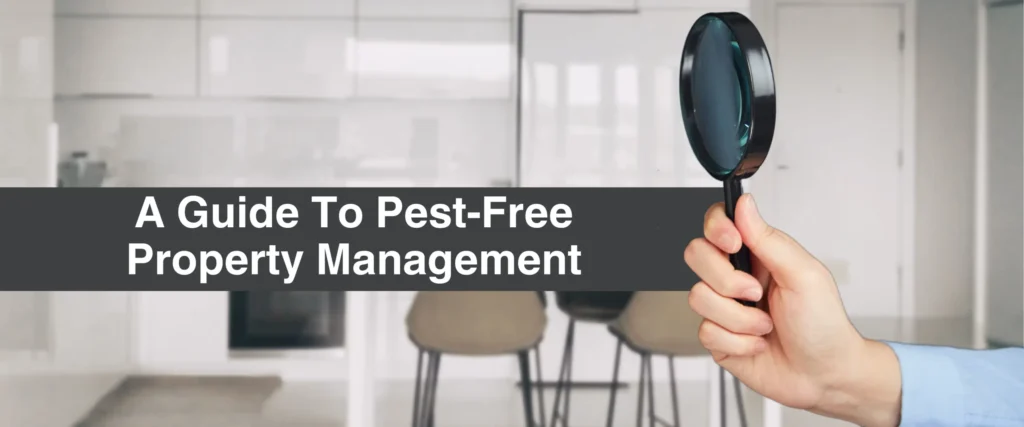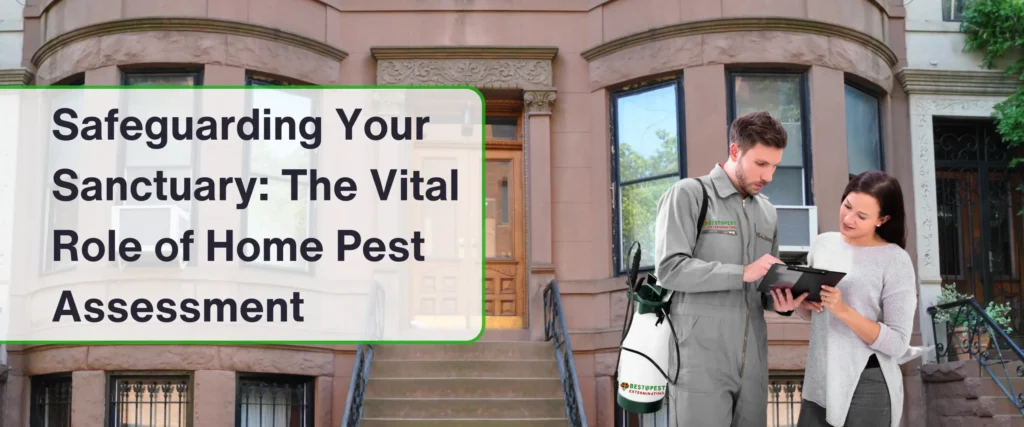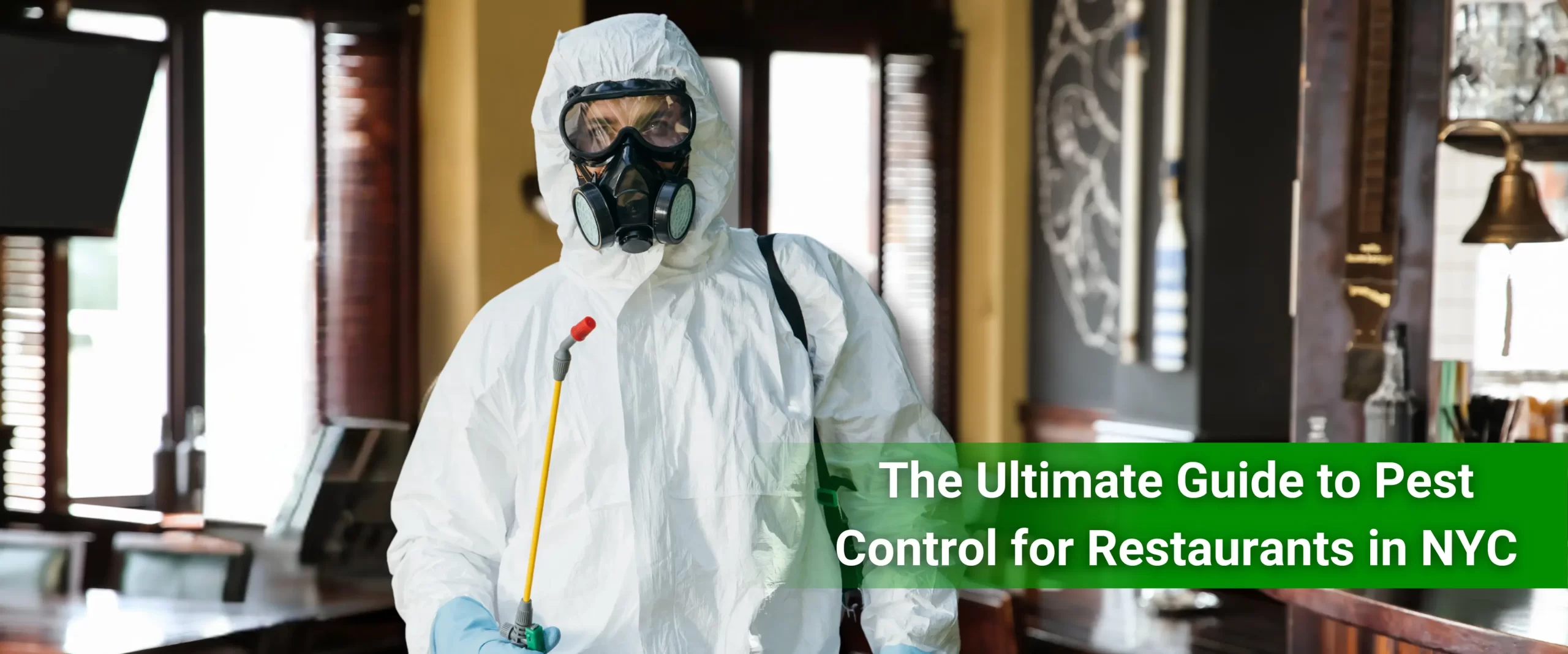
The Ultimate Guide to Pest Control for Restaurants in NYC
In the bustling world of New York City restaurants, there’s one enemy every business owner dreads: pests. A pest-free environment isn’t just a nicety – it’s a critical factor for success. This guide provides comprehensive information on pest control for NYC restaurants, helping you maintain a clean, healthy, and thriving establishment.
Why Pest Control is Essential for NYC Restaurants
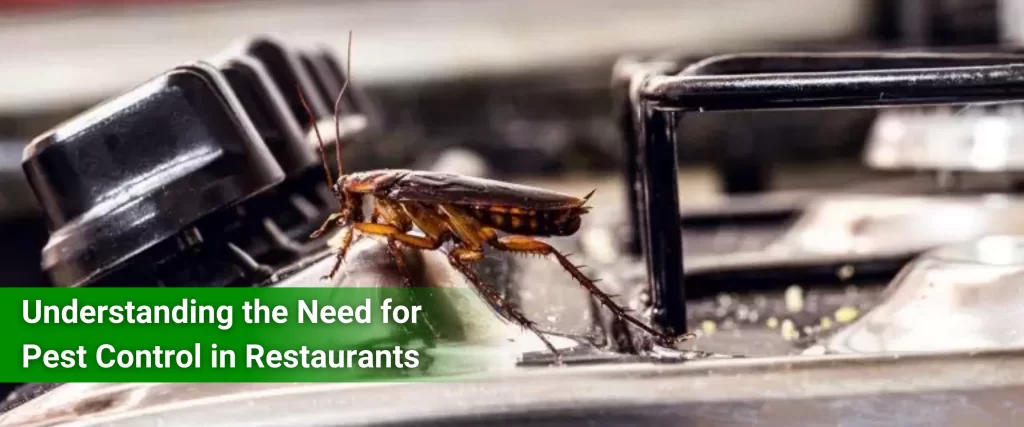
New York City is a haven for food – and unfortunately, that can also attract unwanted guests. Restaurants, with their constant supply of food scraps and warm environments, are particularly susceptible to pest infestations. From scurrying cockroaches to disease-carrying rodents, even a minor pest problem can have disastrous consequences.
Here’s why pest control is a non-negotiable for NYC restaurants:
- Health Inspections: The New York City Department of Health and Mental Hygiene conducts surprise inspections, and a single pest sighting can lead to a failing grade. This not only tarnishes your reputation but can also force closures until the infestation is addressed.
- Customer Satisfaction: The sight of a roach or a buzzing fly can send shivers down a diner’s spine. A pest-free environment ensures a pleasant dining experience, keeping customers happy and returning for more.
- Overall Business Success: Negative online reviews about pest sightings can cripple a restaurant’s reputation. Maintaining a clean and pest-free environment protects your investment and paves the way for long-term success.
NYC’s Unwanted Guests: Common Restaurant Pests
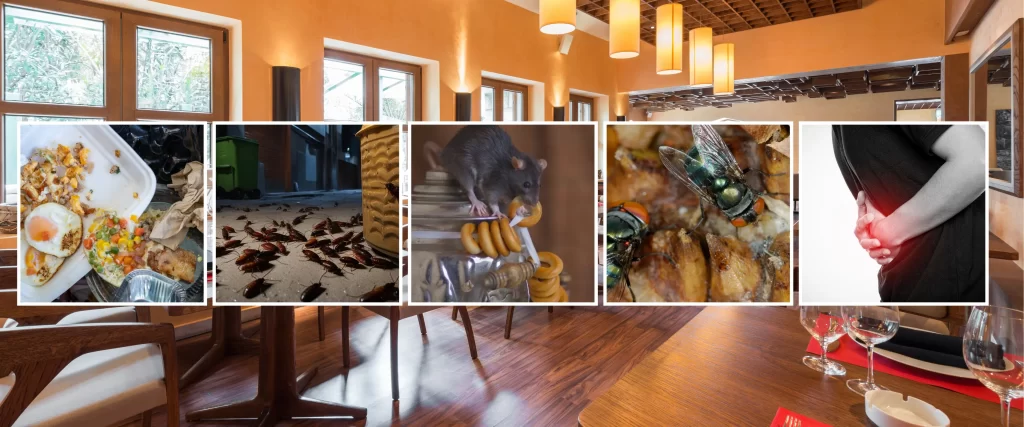
Knowing your enemy is half the battle. Here are some of the most common pests that plague NYC restaurants:
- Rodents: Rats and mice are notorious for squeezing through tiny cracks and seeking out food sources. They can contaminate food with droppings and bacteria, posing a serious health risk.
- Cockroaches: These resilient insects can survive in various environments and spread diseases like dysentery and salmonella. Their presence is a major red flag during health inspections.
- Flies: Fruit flies, houseflies, and drain flies are not only annoying but can also transmit bacteria from unsanitary areas to food prep surfaces.
- Stored Product Pests: Weevils, moths, and beetles can infest dry goods like flour, grains, and cereals, causing product spoilage and financial losses.
The Price of Neglect: Consequences of Pest Infestations
Ignoring a pest problem is a recipe for disaster. Here are the potential consequences of pest infestations in NYC restaurants:
- Health Risks: Pests can contaminate food with harmful bacteria, leading to foodborne illnesses among customers and staff.
- Fines: The NYC Department of Health can impose hefty fines for violations related to pest infestations.
- Legal Issues: Customers who become sick after dining at your establishment may file lawsuits.
- Reputational Damage: News of a pest infestation can spread quickly, damaging your restaurant’s reputation and driving away customers.
By taking proactive measures with pest control, you can prevent these costly and damaging consequences.
Choosing the Right Restaurant Pest Control Company in NYC
When a cockroach scurries across your kitchen floor, or you hear the telltale skittering of mice in the walls, finding a reliable pest control company becomes a top priority. But with a vast array of options in NYC, selecting the right partner can feel like navigating a maze. Here’s how to find reputable restaurant pest control companies that effectively addresses your needs and keeps your establishment pest-free:
- Certifications and Licenses: Ensure the company holds valid licenses from the New York State Department of Environmental Conservation (NYSDEC) and adheres to Integrated Pest Management (IPM) principles.
- Food Service Industry Experience: Choose a company with a proven track record in the restaurant industry. They should understand the unique challenges restaurants face and be familiar with regulations specific to food service establishments.
- Customer Reviews and Testimonials: Research online reviews and ask for references. Positive feedback from satisfied restaurant owners is a strong indicator of the company’s effectiveness.
Beyond one-time treatments, ongoing pest management programs are crucial:
These programs involve regular inspections, targeted treatments, and ongoing monitoring to prevent future infestations. Look for companies that offer customized programs tailored to your specific needs and pest concerns.
Restaurant Insect Control Strategies: Prevention is Key
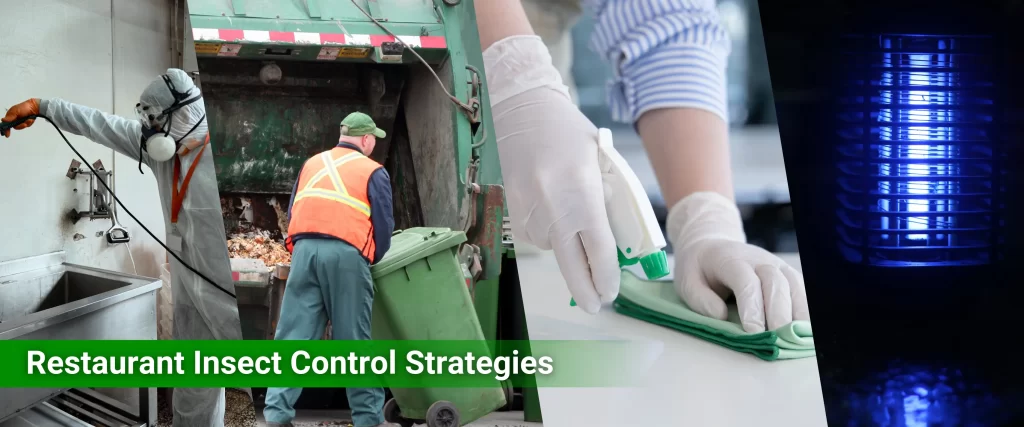
The best defense against pests is a proactive approach. Here are some essential strategies for keeping insects at bay in your NYC restaurant:
- Proper Food Storage: Store all food items in airtight containers, off the floor, and away from walls to eliminate potential harborage areas for pests.
- Waste Management: Dispose of food scraps and waste promptly. Use sealed trash cans and ensure they are emptied regularly to prevent overflowing bins that attract pests.
- Cleaning and Maintenance: Maintain a clean and sanitized environment. Regularly clean floors, counters, and behind appliances to eliminate food debris and potential hiding spots for insects.
- Insect Traps and Baits: Strategically place insect traps and baits in areas prone to pest activity. Monitor these traps regularly and replace them as needed.
Staff Training is Essential:
Educate your staff on proper sanitation practices, food storage procedures, and early signs of pest activity. Empower them to report any pest sightings immediately.
What type of pesticides can you use in a restaurant?
Keeping your NYC restaurant pest-free is essential, but navigating the legalities and safety concerns surrounding pesticide use can be confusing. This section clarifies the regulations, application procedures, and best practices for using pesticides in your establishment.
Understanding the Rules of the Game:
NYC restaurants operate under a strict regulatory environment when it comes to pesticide use. Here’s a breakdown of the key points:
- Limited Application: The use of pesticides in food service establishments is heavily restricted. In most cases, restaurant owners cannot personally apply pesticides.
- Focus on Prevention: The emphasis is on preventative measures like proper sanitation, food storage, and ongoing monitoring for pest activity. Pesticide use should be a last resort.
- Licensed Professionals Only: Only certified commercial pesticide applicators can apply pesticides in a food service establishment. These professionals have the knowledge and training to handle pesticides safely and effectively, minimizing risks to food and customer health.
Who Can Apply Pesticides In A Food Service Establishment?
Since restaurant owners are generally prohibited from applying pesticides themselves, partnering with a licensed pest control company is essential. Here’s how these professionals ensure safe and effective pest control:
- Licensing and Training: Licensed applicators undergo rigorous training and education to understand the proper use, handling, and storage of pesticides. They are also knowledgeable about relevant laws and regulations.
- Site-Specific Assessment: They will conduct a thorough inspection of your restaurant to identify the type of pest infestation, potential entry points, and harborage areas. This allows them to develop a targeted treatment plan.
- Product Selection: Licensed applicators will select EPA-approved pesticides specifically registered for use in food service establishments. These pesticides are formulated to minimize risks to food safety and human health when applied correctly.
Importance of Following Label Instructions and Safety Guidelines:
Even with licensed professionals handling the application, it’s crucial to understand some key safety considerations:
- Read the Label Carefully: Every pesticide has a specific label with detailed instructions for use, including mixing ratios, application methods, and safety precautions. Licensed applicators will adhere to these guidelines, but familiarizing yourself with the label is still important.
- Communication is Key: Maintain open communication with your pest control company. Discuss the planned treatment, potential risks, and any necessary preparation steps you need to take, such as temporarily removing food items from storage areas.
- Prioritize Safety: If you suspect a pest infestation, avoid using over-the-counter pesticides readily available to the public. These products may not be suitable for use in food service establishments and can pose health risks if not handled properly. Leave pest control to the professionals.
Integrated Pest Management (IPM) in Restaurants: A Proactive Approach
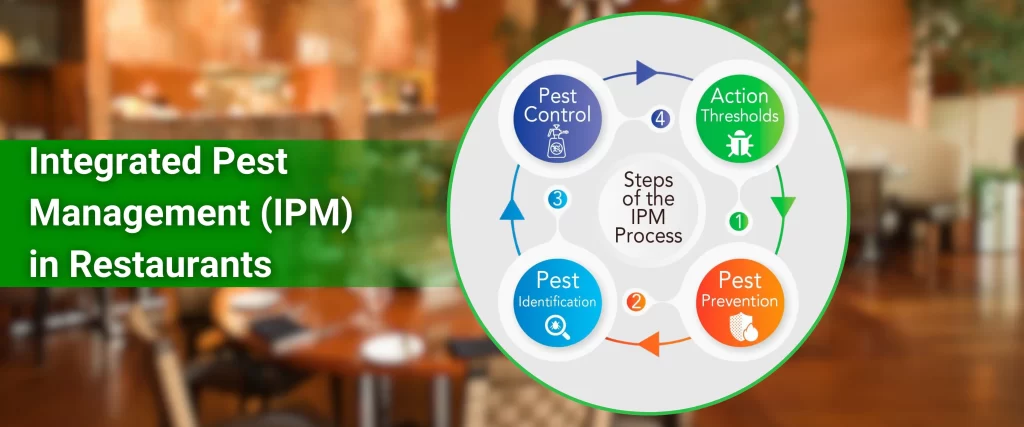
Imagine a world where you can effectively control pests in your NYC restaurant without relying heavily on harsh chemicals. That’s the beauty of Integrated Pest Management (IPM). IPM is a comprehensive, long-term approach that focuses on preventing pest infestations rather than simply reacting to them. Let’s delve into the benefits of IPM and the steps involved in implementing this effective strategy in your restaurant.
The Power of Prevention:
IPM offers several advantages over traditional reactive pest control methods:
- Reduced Reliance on Pesticides: By focusing on sanitation, exclusion techniques, and monitoring, IPM minimizes the need for chemical pesticides. This translates to a safer environment for your staff and customers, and potentially lower costs in the long run.
- Long-Term Effectiveness: IPM addresses the root causes of pest problems, not just the immediate symptoms. This proactive approach prevents future infestations and ensures a more sustainable solution.
- Compliance with Regulations: Many NYC health codes emphasize preventative measures for pest control. An IPM program demonstrates your commitment to maintaining a clean and hygienic establishment.
Putting IPM into Action: A Step-by-Step Guide
Implementing an IPM program in your NYC restaurant is a straightforward process:
1. Inspection and Monitoring:
The first step is to assess your environment. Trained professionals will conduct a thorough inspection of your restaurant, looking for signs of pest activity like droppings, gnaw marks, or harborage areas. They will also set up traps and monitors to identify the types of pests present and track their population levels.
2. Identification of Pests and Problem Areas:
Once the inspection is complete, the next step is to identify the specific pests you’re dealing with. Understanding the biology and behavior of these pests is crucial for developing effective control measures. Additionally, the inspection will pinpoint areas where pests are most likely to enter or harbor, allowing you to address these vulnerabilities.
3. Implementation of Control Measures:
Based on the findings, a customized IPM plan will be developed. This plan may include a combination of strategies such as:
- Sanitation: Eliminating food sources and potential hiding spots for pests is paramount. This includes proper food storage, regular cleaning and maintenance, and proper waste management.
- Exclusion: Seal cracks, repair damaged screens, and address any potential entry points for pests to prevent them from entering your establishment in the first place.
- Physical Controls: Utilizing traps, baits, and other non-chemical methods can help control existing pest populations.
- Judicious Use of Pesticides: If necessary, licensed applicators will use EPA-approved pesticides targeted for specific pests and applied with minimal risk to food safety and human health.
4. Ongoing Evaluation and Adjustments:
IPM is an ongoing process, not a one-time fix. Regular monitoring allows for early detection of pest activity and ensures the implemented strategies remain effective. The program can be adjusted as needed based on changing conditions or pest pressures.
Conclusion
Maintaining a pest-free environment is crucial for the health and success of any restaurant in NYC. By understanding the need for pest control, choosing the right pest control company, implementing proactive strategies, and adhering to regulations regarding pesticide use, restaurant owners can protect their establishments from infestations. Integrated Pest Management offers a sustainable and effective approach to pest control. For optimal results, consider consulting with a local NYC pest control company to develop a customized plan that meets your restaurant’s specific needs. Don’t wait for an infestation to occur—take action now to ensure a safe and sanitary environment for your customers and staff.

